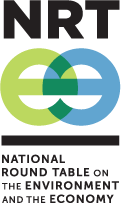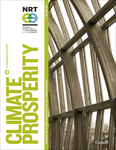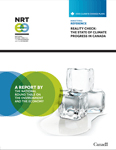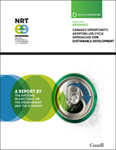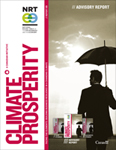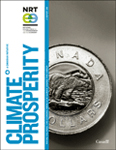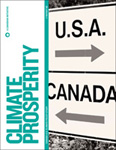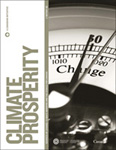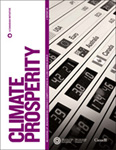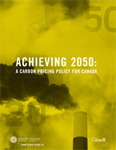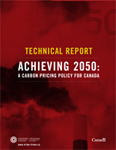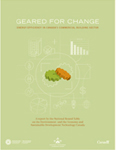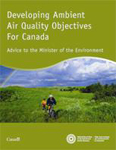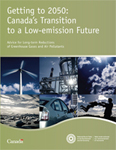News Release – April 16, 2009
A Unified Carbon Price is a Must for Canada to Reach its GHG Reduction Goals: NRTEE recommends responsible, reasonable and realistic Canadian policy for pricing carbon
Ottawa, April 16, 2009 – The National Round Table on the Environment and the Economy (NRTEE) today advised the federal government to move quickly to implement a unified national carbon pricing policy across Canada in order to meet the Government of Canada’s greenhouse gas (GHG) emission reduction targets for 2020 and 2050.
[jwplayer mediaid=”12249″]“The Round Table’s report concludes that a unified national carbon price through an economy-wide cap-and-trade system across all jurisdictions, emissions, and sectors is necessary to allow Canada to reach its emission reductions targets at the least economic costs,” said NRTEE Chair Bob Page.
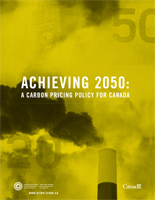 Achieving 2050: A Carbon Pricing Policy for Canada sets out a comprehensive road-map for establishing a national cap-and-trade system in a phased manner, with adequate transition for industry and consumers to allow Canada to achieve its environmental goals at the least economic cost. The NRTEE conducted original economic modeling, detailed analytical research, and extensive stakeholder consultation to develop its proposed carbon pricing policy for Canada. It concluded that an economy-wide cap-and-trade system would be the most effective way to achieve the federal government’s deep long-term emission reduction targets at least economic cost. The policy is designed to initially contain costs for industry and consumers, but then transition to achieve greater carbon emission reductions through full auction of carbon emission permits in order to meet Canada’s environmental targets.
Achieving 2050: A Carbon Pricing Policy for Canada sets out a comprehensive road-map for establishing a national cap-and-trade system in a phased manner, with adequate transition for industry and consumers to allow Canada to achieve its environmental goals at the least economic cost. The NRTEE conducted original economic modeling, detailed analytical research, and extensive stakeholder consultation to develop its proposed carbon pricing policy for Canada. It concluded that an economy-wide cap-and-trade system would be the most effective way to achieve the federal government’s deep long-term emission reduction targets at least economic cost. The policy is designed to initially contain costs for industry and consumers, but then transition to achieve greater carbon emission reductions through full auction of carbon emission permits in order to meet Canada’s environmental targets.
Key elements of the policy include:
- A national cap-and-trade system to price carbon and provide real market incentives for firms and households in Canada to change their technology choices and behaviour in order to reduce emissions.
- Complementary regulations and technology policies to improve the cost-effectiveness of the cap-and-trade system by broadening coverage across all key emission sources, while supporting targeted technology development and deployment.
- Participation in international markets through trading and credit purchases to help reduce economic costs at home by allowing Canadian firms and consumers access to credible emission reductions internationally.
- A new climate governance mechanism, including a carbon pricing and revenue authority to ensure collaborative and coordinated implementation of the carbon pricing policy over time, making sure it sends a clear and certain price signal to industry and consumers, while remaining responsive to new information and situations.
“Our proposed carbon pricing policy for Canada is responsible, reasonable and realistic” said David McLaughlin, President and CEO of the NRTEE, “It integrates environmental and economic considerations, provides an adequate transition period for implementation, and builds on existing federal, provincial, and international approaches.”
The Round Table’s research shows that there was a higher cost to a continued fragmented approach to carbon pricing across Canada than those found under the proposed unified carbon pricing approach.
The NRTEE’s analysis shows that under the proposed policy the Canadian economy, as a whole, would continue to grow under the proposed carbon pricing policy but at a somewhat reduced rate. Some sectors, regions and Canadians would be impacted more significantly than others but this can be addressed through the design of the proposed policy and auction revenue recycling measures targeted at households and businesses.
“A unified approach is better for Canada overall at keeping costs down for companies and consumers” said NRTEE member Robert Dubé. “New collaborative governance mechanisms we are proposing will make it easier and more effective for the federal, provincial, and territorial governments to work together and meet our environmental goals, at the least economic cost.”
The NRTEE believes now is the time to prepare Canada and Canadians for a low-emission future.
“We see an opportunity for Canada to position itself for a sustainable economic recovery based in part on a unified, carbon pricing policy that prepares us positively for the transition to a low-carbon global economy”, said Bob Page. “The time to act is now.”
For more information:
Tony Bégin
Communications Advisor
613-944-4781
begint@nrt-trn.ca
Full copies of the report available on-line at www.nrt-trn.ca.
